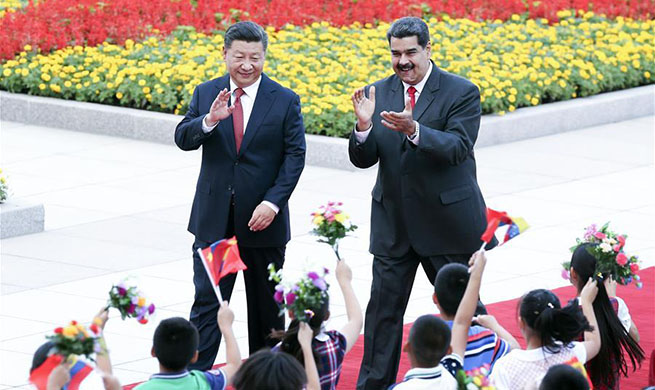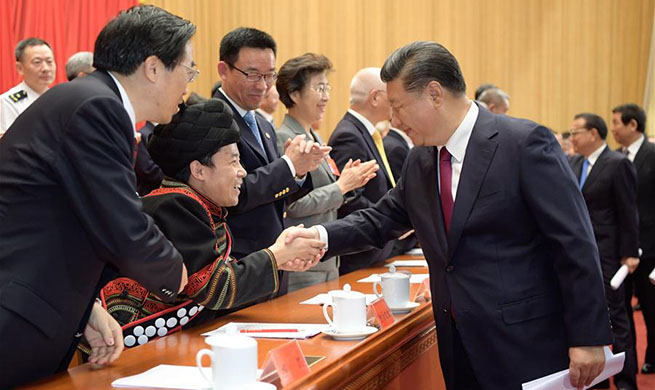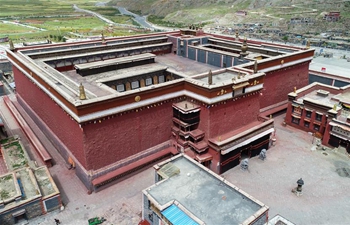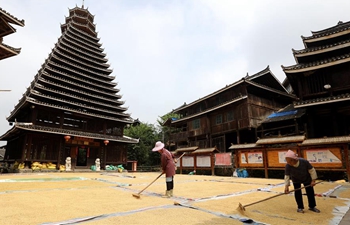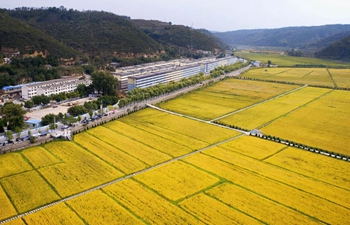TOKYO, Sept. 14 (Xinhua) -- Japanese Prime Minister Shinzo Abe and former Defense Minister Shigeru Ishiba on Friday held a policy debate on a variety of pivotal issues as campaigning continues ahead of next week's Liberal Democratic Party (LDP) leadership contest.
Abe, who if he wins his third successive three-year term as head of the LDP, will effectively become Japan's longest serving prime minister, pledged to address Japan's severe demographic issues, calling Japan's aging and shrinking population a "national crisis."
He proposed to overhaul the social welfare system to allow workers who are aged 65 or older to continue working beyond their retirement age, as well as allowing people aged over 70 to chose for themselves when to start receiving pension payouts.
Ishiba, for his part, highlighted the fact that the funding necessary for the country's social welfare system must be secured, and reiterated his stance on revitalizing regional economies as they could become potential new growth drivers.
He said that he does not believe that big businesses expanding will have any benefit on regional economies.
In terms of social security costs, the government has requested a record high budget of 102.5 trillion yen (916 billion U.S. dollars) for fiscal year 2019, with Japan's Ministry of Health, Labor and Welfare asking for 31.90 trillion yen (285 billion U.S. dollars), a new record high and a 2.5 percent increase from the previous budget, as it continues to grapple with swelling spending on welfare costs.
According to the ministry, its expenditure is set to rocket to more than 32 trillion yen (286 billion U.S. dollars), up by about 600 billion yen (5.36 billion U.S. dollars).
This comes against a backdrop of various iterations of the prime minister's "Abenomics" brand of economic policies, yet Japan, the world's third largest economy, has a public debt amounting to 236 percent of its gross domestic product (GDP), which remains the worst in the industrialized world.
Ishiba, during Friday's debate, voiced his criticism of "Abenomics," which has failed to fix or significantly impact Japan's woeful fiscal health, while the Bank of Japan continues to struggle to definitively pull the nation out of deflation and hit its lofty 2 percent inflation target.
As for other key themes, Abe said his career goal of amending Japan's pacifist constitution remained unchanged. "I'm determined to start a new era for Japan by tackling what we haven't been able to do for the past 70 years since the end of the war, a constitutional revision," said Abe.
The prime minister wants to specifically reference the Self-Defense Forces in the constitution so as there is no ambiguity about their constitutionality.
But Ishiba, who has taken a cautious stance towards Abe's plans, maintained that the Constitution should not be amended without a full and sincere explanation to the public.
"It doesn't mean all is well as long as the SDF is written," Ishiba argued.
He said that he disagrees with Abe's methodology of changing the charter and said they both remain duty-bound to present all the facts to the public as that is where sovereignty resides.
He added that a more fundamental approach should be taken.
On disaster prevention, as the nation has been battered by torrential rains, typhoons and earthquakes recently, Abe vowed to carry out emergency measures over the next three years to help prevent and mitigate the effects of disasters when they occur and improve the nation's resilience.
Ishiba said that a dedicated government office that specializes in disaster preparedness should be created and overseen by a minister, with its staff in a state of preparedness 24 hours a day, 365 days a year.
The LDP presidential election votes will be counted and the winner announced on Sept. 20.






